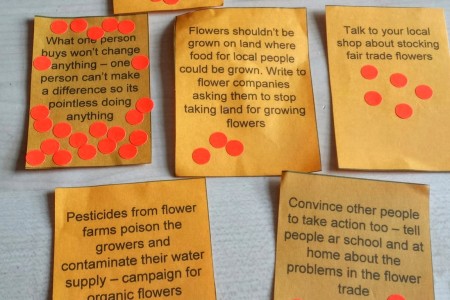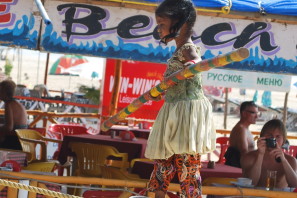Background
In our mixed suburban comprehensive school pupils and colleagues are often reluctant to set fund raising aside and think of other ways to make a difference. As a response to this we’ve made Fairtrade a key part of our school’s global citizenship work for over five years, which includes celebrating Fairtrade Fortnight each year and engaging colleagues across the curriculum in Fairtrade activities. We felt we’d done bananas, chocolate, and other foods to the absolute limit, so tried to move on to thinking about our impact as consumers in a wider context.
With different year groups we explored the fashion industry, electrical goods such as mobile phones and computer games and bottled water…but with Valentines Day, Fairtrade Fortnight and Mothers’ Day coming up in the term ahead, we settled on investigating the flower trade in KS3 Geography, to fit with a year 8 topic on globalisation, with three classes taking part.
What we did
We decided we needed more evidence of the impact of teaching about global themes on our pupils’ attitudes and behaviour. So, at the start of the two-week Flower topic we used a quiz to introduce pupils to information and issues relating to the flower trade and discussed the image of flower growers in Kenya. To get a snapshot of what they thought they could do at the start we adapted nine of the cards from the activity ‘what would make the most difference?’
Firstly we asked pupils in small groups to arrange them in a ‘diamond 9’, with the action they thought would make the most difference at the top, through to least difference at the bottom.
Secondly, to see if we could find out what actions they might be prepared to take themselves, we gave pupils 3 stickers each and asked them to put them on the activities that they would be most likely to do.
We photographed each group’s final diamond, complete with stickers, and the pupils scored the cards with 9 (for top choice) 7 (second row) 5 (middle row) 3 (fourth row) and 0 (bottom row). We then gathered their scores, and came up with a total for each card.
Amalgamated results from one class
| CARD | TOTAL SCORE |
| Only buy Fairtrade flowers | 63 |
| People in countries like Kenya, need work. The flower industry provides jobs – so choose imported flowers | 58 |
| Stop buying flowers | 41 |
| What one person buys won’t change anything – one person can’t make a difference so its pointless doing anything | 38 |
| Flowers shouldn’t be flown thousands of miles when pollution from planes damages the environment. So only buy locally grown flowers | 38 |
| Talk to your local shop about stocking Fairtrade flowers | 27 |
| Convince other people to take action too – tell people at school and at home about the problems in the flower trade | 19 |
| Pesticides from flower farms poison the growers and contaminate their water supply – campaign for organic flowers | 15 |
| Flowers shouldn’t be grown on land where food for local people could be grown. Write to flower companies asking them to stop taking land for growing flowers | 14 |
The pattern that emerged showed us that pupils were more inclined to value actions they could relate to. Most didn’t really understand what campaigning was and how they might be involved.
The results told us that pupils thought supporting Fairtrade was a good idea; the majority knew that Fairtrade flowers are available, but their comments were very superficial e.g. ‘Fairtrade is good, put it near the top’ ‘Fairtrade means workers get more so it would help them’. We felt we needed to deepen their understanding of social justice and encourage them to think more critically about Fairtrade as well as making them more aware of a range of actions to bring about change, especially if they worked together.
Our learning objectives
- To develop pupils’ critical thinking about globalisation and further their understanding of Fairtrade.
- To involve pupils in exploring their own learning and in thinking about taking action for social justice.
We began the teaching and learning by using the development compass rose from Leeds DEC to gain more of an insight into the flower growers photo. Most of the pupils’ questions were answered by this article and the film that goes with it – although this also raised more issues, especially about workers rights and who made the decisions.
http://www.theguardian.com/environment/2011/apr/01/kenya-flower-industry-worker-conditions-water-tax It acknowledges the importance of the flower trade to the Kenyan economy and the impact of recent campaigns while raising concerns about low pay, tax avoidance by flower companies and competition with fisherfolk and Maasai pastoralists for scarce water resources.
Pupils did their own research into flower production in other countries such as Colombia and Nicaragua and reported back on their findings.
We also looked at activists from around the world, past and present, who had stood up for human rights, campaigned for change and made a difference. These included Malala Yousafzai, Wangari Maathai and Chico Mendes.
At the end of the two weeks we repeated the diamond rank activity, introducing a slightly different selection of cards. The pupils themselves looked at the difference in the results; the most encouraging findings were:
What one person buys won’t change anything – one person can’t make a difference so it‘s pointless doing anything This had, in most cases, moved from the top to the the bottom part of the diamond, with pupils agreeing that through working together it is possible to bring about change
It’s all too complicated – just don’t buy flowers This was a ‘new’ card, which was placed towards the bottom of the diamond, with many pupils feeling that it isn’t right to ignore the problem
Convince other people to take action too – tell people at school and at home about the problems in the flower trade This had risen from the bottom to the top part of the diamond, with some pupils deciding to do an assembly before Mothers‘ Day to raise awareness and suggest alternatives to imported flowers. Another group set up a petition to the main flower companies, asking for them to abide by the Ethical Trading Initiative base code of workers rights, which they had researched. They asked for signatures at the end of the assembly.
Our learning
We were pleased that this topic had opened up discussion about local versus Fairtrade products, as well as pupils researching and thinking through the implications of boycotting flower shops and flower importers, including what this would mean for different parts of the supply chain.
We felt pupils had increased their understanding of how globalisation is part of all our lives and how doing nothing to address injustice contributes to an unfair system of trade.
Empowering pupils to reflect on their own learning, how it impacted on their attitudes and what they would or wouldn’t be prepared to do, was interesting and an area we would aim to develop further when repeating this topic.
With only a fortnight between the two audits we weren’t surprised that the shift in pupils’ attitudes seemed small. It would also be really interesting to see whether it made any difference to the things they actually buy. However, we felt their awareness had been raised and, within the bigger picture of their development as active global citizens, this added to their understanding of the importance of participation if they are to contribute to a more just and sustainable future.
Links
Compass Rose consultation pack



